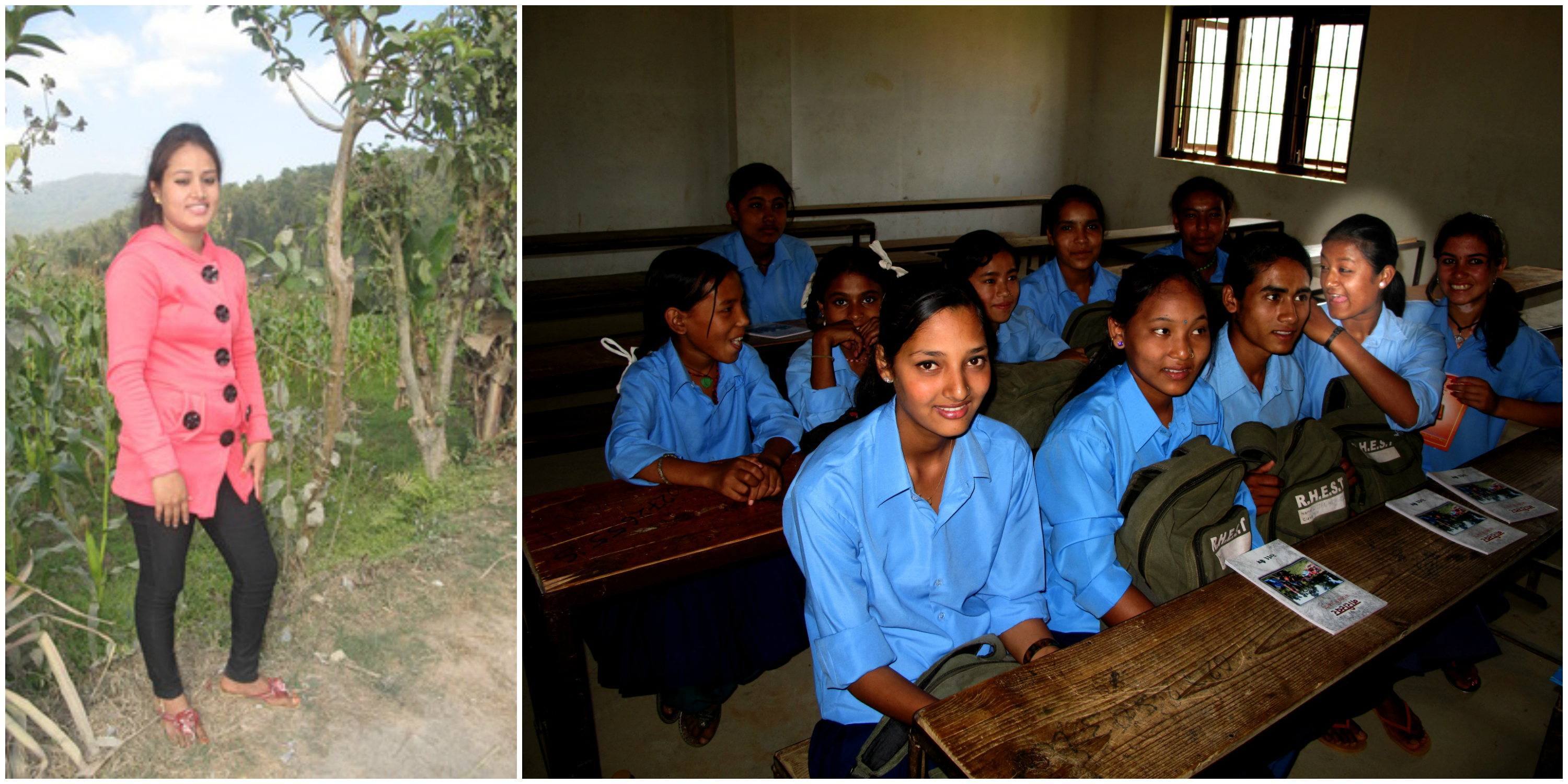We’ve described in recent posts the inspiring work of Dr. Aruna Uprety, keeping girls and young women in Nepal informed and protected from traffickers for nearly 25 years, while partnering with our many passionate donors in STOP Girl Trafficking to support their education.
We’d like to introduce now you to Rekha (left photo, above) and Rukmani (right photo, first row, pointing to classmate in second row). We believe their stories show how girls from the poorest, most isolated communities can charge ahead and contribute to their society when given the chance. We hope you agree.
Rekha
“She’s a hard-working girl,” says Aruna.
And indeed, Rekha is.
A strong work ethic and the virtues of paying her own way came early in life for Rekha. Her father died when she was two and a younger sister an infant. Raised by a grandmother after her mother abandoned the girls, Rekha made it through sixth grade before the money ran out. So she worked as a farmhand, paying her own way through middle school into the eighth grade.
Eighth grade is the school year of Nepal’s highest dropout rate. Junior high is more expensive, studies are more difficult, so each January Aruna’s staff keeps a close watch on which girls might soon be pulled out of school, or are already out of school and under the radar.
When school officials resist enrolling girls – yes, this still happens – Aruna and her staff push back, often with the aid of sympathetic women in villages who know family situations and which girls are most at risk. And by making funds available to cover annual fees of $100 per student.
For Rekha, eighth grade is when Aruna’s team and SGT funding dramatically change her life. The funding and other support “was a huge relief,” says Rekha.
Her talents and determination were obvious to Aruna’s staff. She saved money waiting tables in a tourist hotel, working afternoons after attending morning classes in eleventh and twelfth grades. A top student, she went on to earn a college degree in education – paying her own way and teaching groups of girls about family planning and violence young women face in rural Nepal.
A gifted counselor, Rekha was one of the first former SGT students hired onto Aruna’s teams of local advisers. Now 26, she is married, staying at home with her 18-month-old child. She hopes to reconnect with Aruna’s staff as a volunteer in the next year.
Rukmani
Who are your heroes? When we ask that question to high schoolers in rural Nepal these days, we hear a name that for the uninitiated is unexpected: “Rukmani!”
Not unexpected by our field staff, though. Rukmani is a serial entrepreneur. Not the makings of epic Silicon Valley lore, at least not yet, but you can sense quickly when someone has creativity, drive, and self-assurance. Rukmani has it.
Still in her mid-twenties, she has loyal customers for rides on electronic bicycle rickshaws, the grocery store she manages for her husband’s family, and in recent months for poultry she has begun producing at commercial scale. She is an icon, a rock star among SGT girls who eagerly swap Rukmani stories. “I want to be like Rukmani,” they say.
Thousands of girls in family situations like the one Rukmani faced ten years ago might have had a darker fate, as thousands do today. Aid groups estimate as many as fifteen thousand Nepali girls are trafficked every year into India, the Gulf countries, Africa, and Tibet. Rukmani was sixteen then, an eighth-grader. Her father had just died. Her mother had little income.
Rukmani would have been a prime target for traffickers, unaware and unprotected, if forced to leave school and look for work in Kathmandu, the teeming metropolis of five million people less than an hour from her home. Within Nepal, more young girls are migrating to cities, where they are vulnerable to abuse as housemaids for the wealthy.
Her education certainly would have ended if Aruna and her team had not intervened. But, the good news is they did. Backed as Rekha was with funds from SGT, Rukmani continued her studies through twelfth grade while learning about the dangers Nepali girls face. Motivated, grateful, she became one of Aruna’s field volunteers, helping to spot and recruit girls as she once was spotted and recruited.
Now Rekha inspires hundreds of students following in her footsteps. For many she is their role model: an educated, confident young woman in Nepal, married by her own choice (at age 23), forging ahead with a life of her own design, and her own making.
** **
We’re excited to have Aruna, Jon Krakauer, National Geographic’s 2016 Adventurer of the Year Pasang Lhamu Sherpa Akita, and award-winning journalist and film maker Subina Shrestha as speakers at our annual dinner to raise funds for STOP Girl Trafficking. This year’s event in San Francisco is this Thursday …March 23.
“In this country, we have resources,” says Jon. “By sparing just a very small amount of these resources you can make a difference in a far corner of the world.”
To learn more about STOP Girl Trafficking and how to contribute, please visit the American Himalayan Foundation blog.
Photos courtesy of the American Himalayan Foundation


Leave a Reply